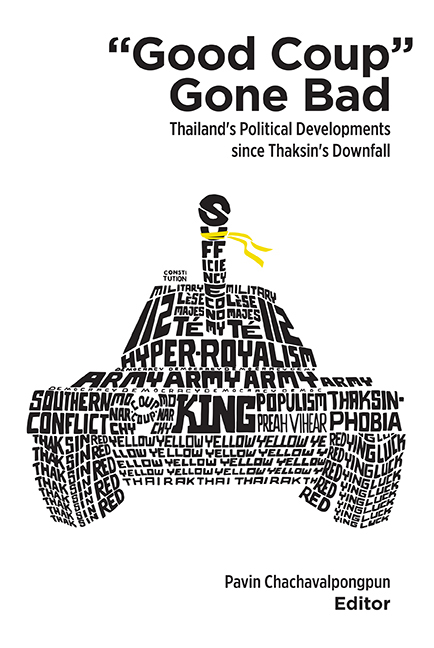Book contents
- Frontmatter
- Contents
- List of Tables and Figures
- Foreword
- Contributors
- Abbreviations
- Section I The 2006 Military Coup: Impact on the Thai Political Landscape
- 1 “Good Coup” Gone Bad: Thailand's Political Developments since Thaksin's Downfall
- 2 Unfinished Business: The Contagion of Conflict over a Century of Thai Political Development
- Section II Defending the Old Political Consensus: The Military and the Monarchy
- Section III New Political Discourses and the Emergence of Yellows and Reds
- Section IV Crises of Legitimacy
- Index
- Plate Section
1 - “Good Coup” Gone Bad: Thailand's Political Developments since Thaksin's Downfall
from Section I - The 2006 Military Coup: Impact on the Thai Political Landscape
Published online by Cambridge University Press: 21 October 2015
- Frontmatter
- Contents
- List of Tables and Figures
- Foreword
- Contributors
- Abbreviations
- Section I The 2006 Military Coup: Impact on the Thai Political Landscape
- 1 “Good Coup” Gone Bad: Thailand's Political Developments since Thaksin's Downfall
- 2 Unfinished Business: The Contagion of Conflict over a Century of Thai Political Development
- Section II Defending the Old Political Consensus: The Military and the Monarchy
- Section III New Political Discourses and the Emergence of Yellows and Reds
- Section IV Crises of Legitimacy
- Index
- Plate Section
Summary
In the evening of 19 September 2006, the military staged the eighteenth coup since the abolition of absolute monarchy in 1932, overthrowing the elected government of Thaksin Shinawatra. Although Thailand adopted a democratic model of governance to replace the ancien régime, the military has imposingly dominated the Thai political space throughout the past eighty years. It has worked intimately with the monarchy in cultivating a particular kind of politics whereby civilian governments are kept vulnerable, or face the possibility of being toppled should they pose a menace to the power position of the traditional elite. Under these conditions, coups were therefore not uncommon, especially as a tool to undermine a strong civilian government. The military's political intervention has become part of Thai political culture. Often, there have been attempts on the part of the military to legitimize the coups as a moral instrument in the riddance of immoral civilian regimes. From 2001 to 2006, Prime Minister Thaksin Shinawatra enjoyed electoral popularity, and thus managed to firmly consolidate his grip on power. He won two landslide elections, in 2001 and 2005, becoming the only prime minister who had ever served a full four-year term in Thai history. But his intensifying political strength gravely worried the traditional elite. They perceived him as a threat to their long-held political influence. With political interests in jeopardy, and in exercising the old trick, the traditional elite removed the Thaksin regime with the bluntest of tools; a military coup. They accused Thaksin of displaying disrespect for the King and committing corruption, among other things. These accusations served to justify the unlawful coup as a necessity to punish the fraudulent government of Thaksin. A large number of middle-class Bangkok residents came out to lend their support for the coup; they were seen offering food and flowers to Thai soldiers who seized power on that ill-fated night.
- Type
- Chapter
- Information
- Good Coup Gone BadThailand's Political Development since Thaksin's Downfall, pp. 3 - 16Publisher: ISEAS–Yusof Ishak InstitutePrint publication year: 2014

